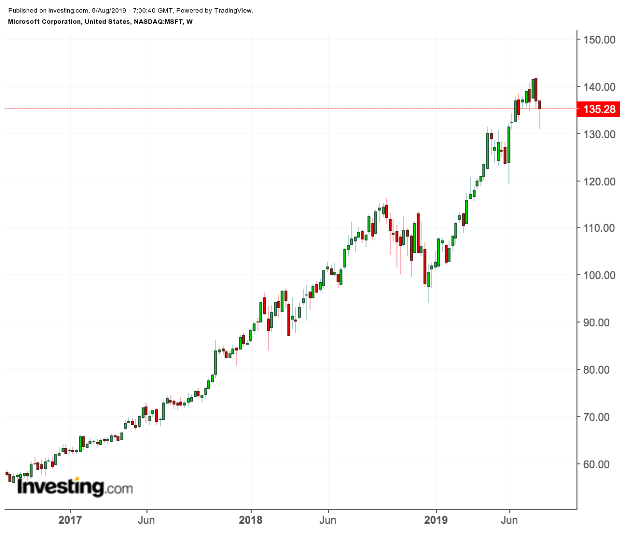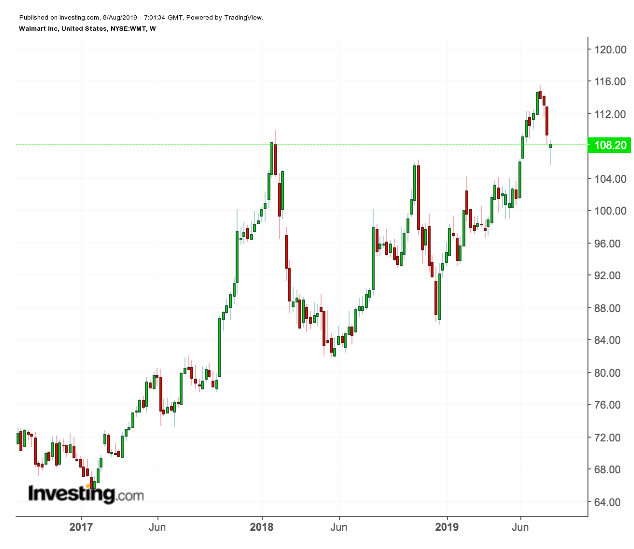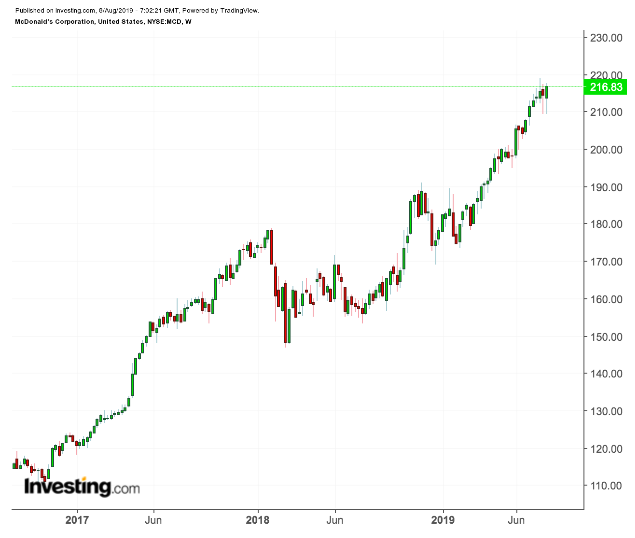It’s difficult to predict when the next recession will arrive. The latest U.S. expansion has defied a variety of odds since the Financial Crisis of 2008, continuing its upward journey.
But the latest headwinds to global growth make it clear this is probably the most sensitive phase in the decade-old expansion. Prompted by the escalating trade war between the U.S. and China, global economies are slowing and central banks are cutting rates.
Morgan Stanley economists predict that if the U.S. puts 25% tariffs on all Chinese imports for four to six months and the Asian country hits back, a global economic contraction is likely within three quarters.
While it's almost impossible to completely avoid risk if you’re an equity investor, it is possible to minimize it. The best way to do this is to diversify your portfolio by including defensive stocks that perform well in an economic downturn. Here's a short list from different sectors to better prepare for bad times:
1. Microsoft
Many mistake Microsoft (NASDAQ:MSFT) for a pure technology play that only suits those looking for growth. But in our view, it's also a great defensive stock that will add strength to investor portfolios.

No doubt Microsoft remains the darling of growth investors. It's had eye-popping returns over the past five years, benefiting from a surge in technology investments, its foray into cloud computing and the strength of its core Office products. That diversification gives Microsoft a durable advantage over competitors, making its a long-term defensive play for a buy-and-hold portfolio.
The tech giant has an 82% share of the desktop operating system market, generating massive amounts of recurring cash for this company. Office, which is now a subscription-based service for Microsoft’s millions of home and corporate users, continues to be a powerful driver of earnings. In the last fiscal year, these two units drove more than half of Microsoft's total sales.
With an annual dividend yield of 1.34%, Microsoft pays a quarterly dividend of $0.46 per share. That yield may look small to many investors, but don’t forget that Microsoft is still growing, while offering great upside potential, too. Including dividend payments, Microsoft has delivered 213% in total returns over the past five years.
2. Walmart
Another portfolio hedge during times of market distress is to own companies that produce or sell products and services that are crucial to our daily lives. Giant retail companies fit this profile well. The logic: in times of economic recession, you may cut your fine dining budget, but there's little chance you'll scrimp on basic grocery shopping.

This built-in protection makes the world’s largest brick-and-mortar grocer, Walmart (NYSE:WMT), a great defensive play. What should be even more encouraging for long-term investors is the fact that Walmart will enter the next recession, when and if that comes, from a position of great strength. The big-box giant’s earnings expansion, which started in 2015, has become a new normal, helped by its massive investments in online channels to boost sales.
Currently trading at $108.20, Walmart may not have too much upside left after rallying more than 17% this year. Still, it’s certainly a stock which is likely to outperform if the economy slips into a recession.
Walmart’s rock-solid dividend is an added benefit. With a yield close to 2% and a quarterly payout of $0.53, this stock is a good choice to own through the thick-and-thin of market activity. As well, the company has an impressive track record when it comes to returning cash to its investors.
3. McDonald’s
One big consideration for any defensive bet should be whether a stock can generate enough cash flow during both good and bad times so that their dividend continues to be paid. Based on this metric, there aren’t many companies that can beat McDonald’s (NYSE:MCD) payout history.

The company has raised its dividend each and every year since 1976, when it first started paying dividends. That's solid proof McDonald's fast food business has the power to satisfy income-hungry investors.
It pays quarterly dividends of $1.16 per share. That translates to an annual dividend yield of 2.2% at the current share price. With a low payout ratio of 59%, there's a little risk the fast good behmoth can't sustain its payouts even if the economy slips into a recession.
Bottom Line
Buying low-risk stocks which pay regular dividends is a prudent strategy ahead of any possible downturn. Microsoft, Walmart, and McDonald’s can give you a strong start.
